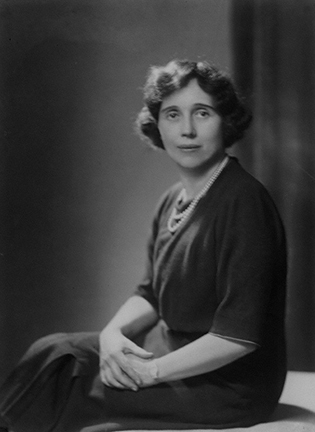Women of History: Thelma Cazalet-Keir

Portrait of Thelma Cazalet-Keir, circa 1935-1945.
Photo by Elliott & Fry. © National Portrait Gallery, London.
Christian Science teaches that right thinking can heal, and numberless people, including myself, have been privileged to prove in a small way the sayings of Jesus that all power belongeth unto God.
—Thelma Cazalet-Keir
Thelma Cazalet-Keir (1899-1989) is best known as one of Britain’s first female Members of Parliament. Along with two other early MPs, Nancy Astor and Margaret Wintringham, she was a Christian Scientist and practiced her faith throughout her life.
Born into a wealthy London family, Thelma Cazalet had opportunities to meet leading politicians and dignitaries of her day. She developed a love of the arts, and took up her mother’s devotion both to Christian Science and to women’s equality. The latter would become a hallmark of her work in Parliament, while her autobiography indicates that the former lay at the heart of her lifework: “It is always difficult to talk or write about one’s religion, because it is seldom possible to eradicate the universal tendency of human nature to err, and always difficult, without lapses, to live up to what one believes to be right and true. Nevertheless, my story would be incomplete if I failed to mention what is the most important thing in my life…. To me, Christian Science is a way of life based entirely on Christ’s teachings” 1
Cazalet entered local politics in 1924 and served on the London County Council with a particular interest in educational issues. She was elected to Parliament in 1931 for the National Conservative Party and became the second woman Conservative to achieve the notable position of Cabinet Minister.
In Parliament Cazalet had the distinction of upstaging Winston Churchill over an amendment mandating equal pay for women teachers. It carried by a single vote and marked the only defeat for Churchill’s wartime coalition. Subsequently she was forced to vote against her own amendment in order to affirm her support for the Prime Minister. Nonetheless she had accomplished something significant—Churchill set up a committee to study the issue and appointed her as education secretary in 1945 (a short-lived post, it turned out, as she lost her seat of 14 years when the party was voted out only months later).
In 1939 she married David Edwin Keir (1906-1969), a parliamentary correspondent for the News Chronicle, and changed her name to Cazalet-Keir. Adopting this double name can be seen as representing her views on equality, but by it she might also have meant to enhance her political name recognition.
After leaving Parliament, Cazalet-Keir stayed active working for causes she loved, especially in the arts. She served as a governor of the BBC for five years and at one point operated a flower shop. She died at home in London on January 13, 1989, at the age of 89.
Listen to “Among the first to stand—Christian Science and women in Parliament,” Seekers and Scholars podcast episode featuring Dr. Mari Takayanagi, Senior Archivist at the Parliamentary Archives in the UK Houses of Parliament, and independent scholar Robin Harrigan.

